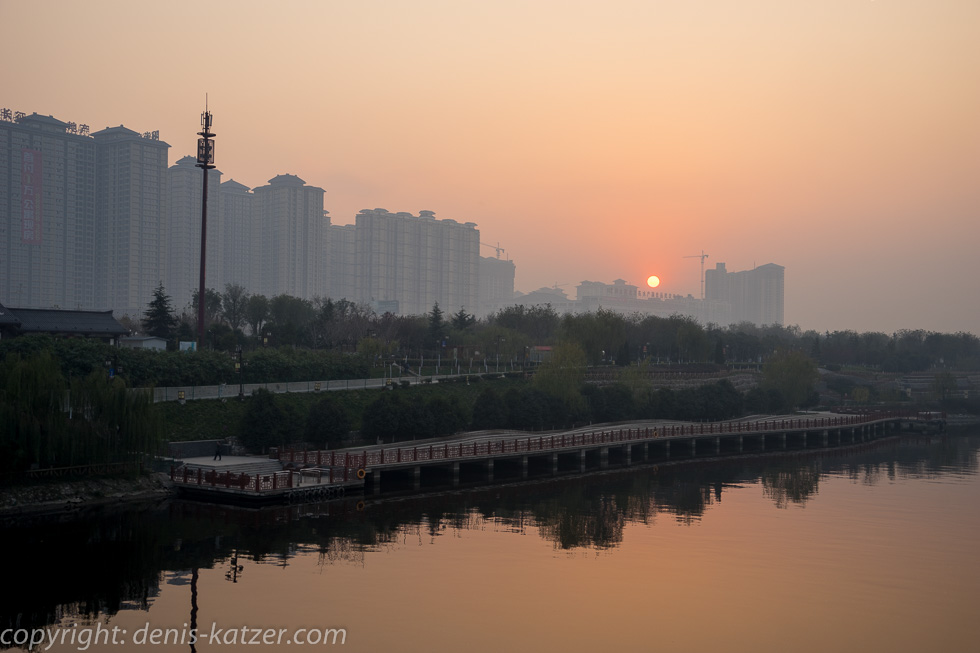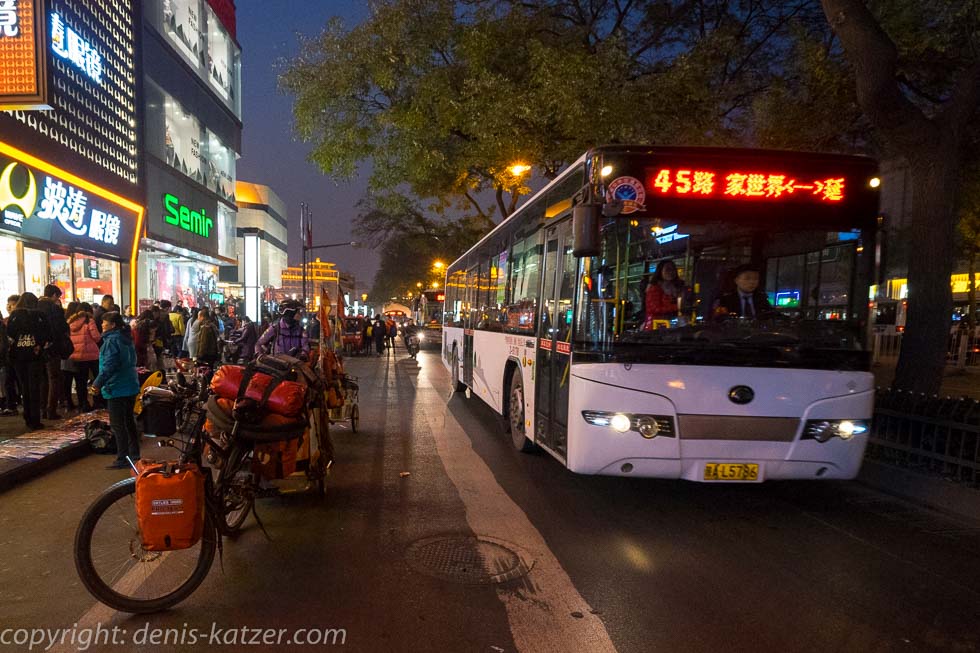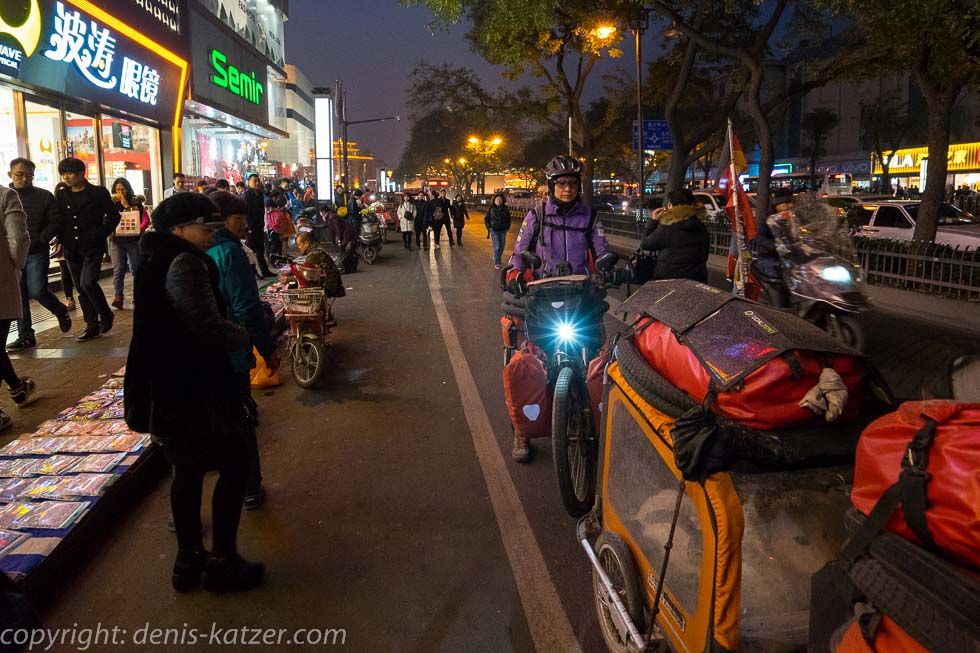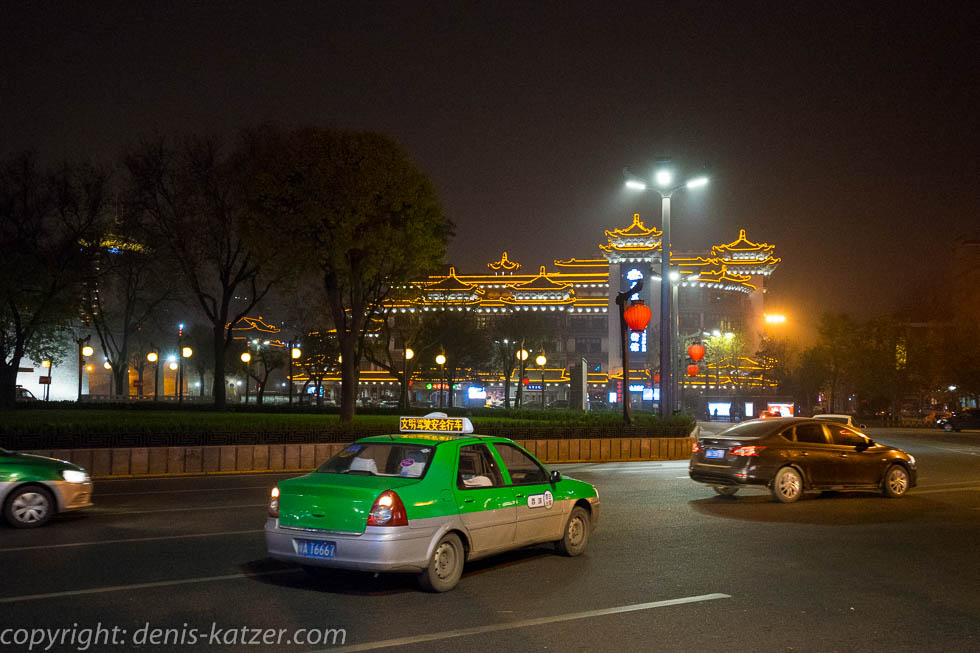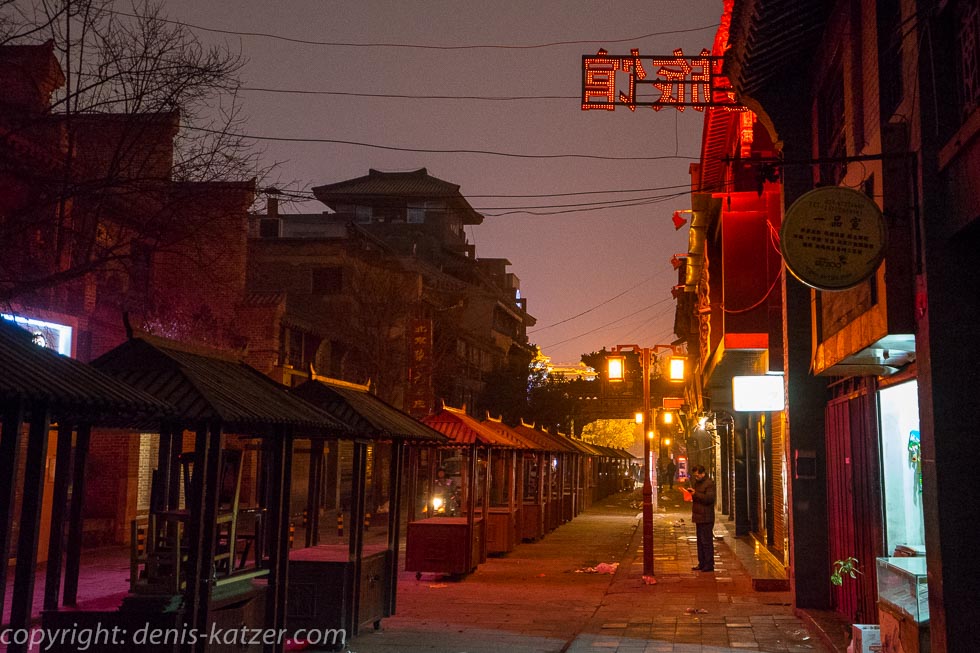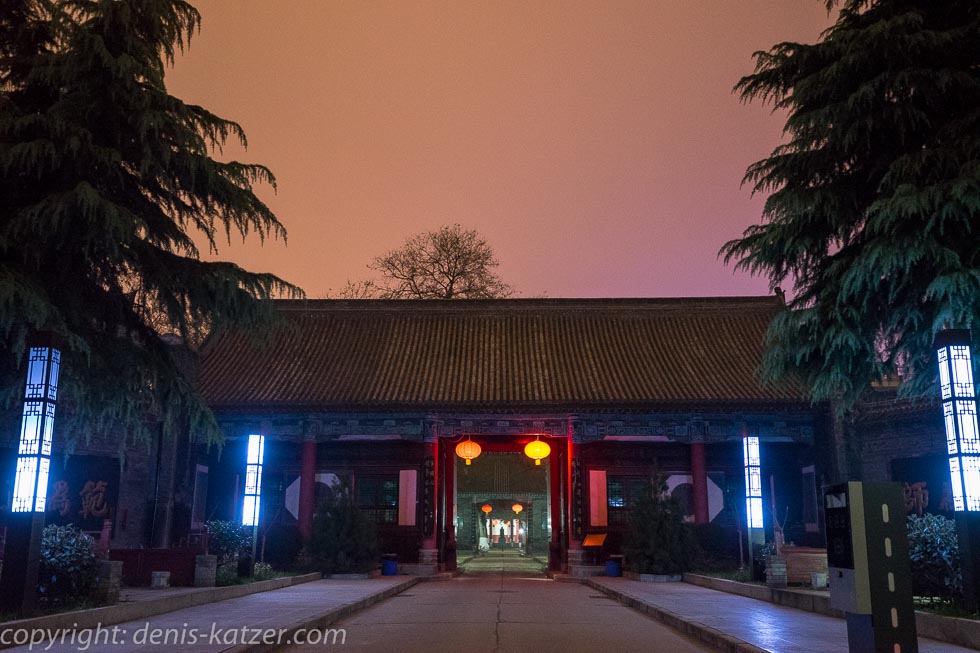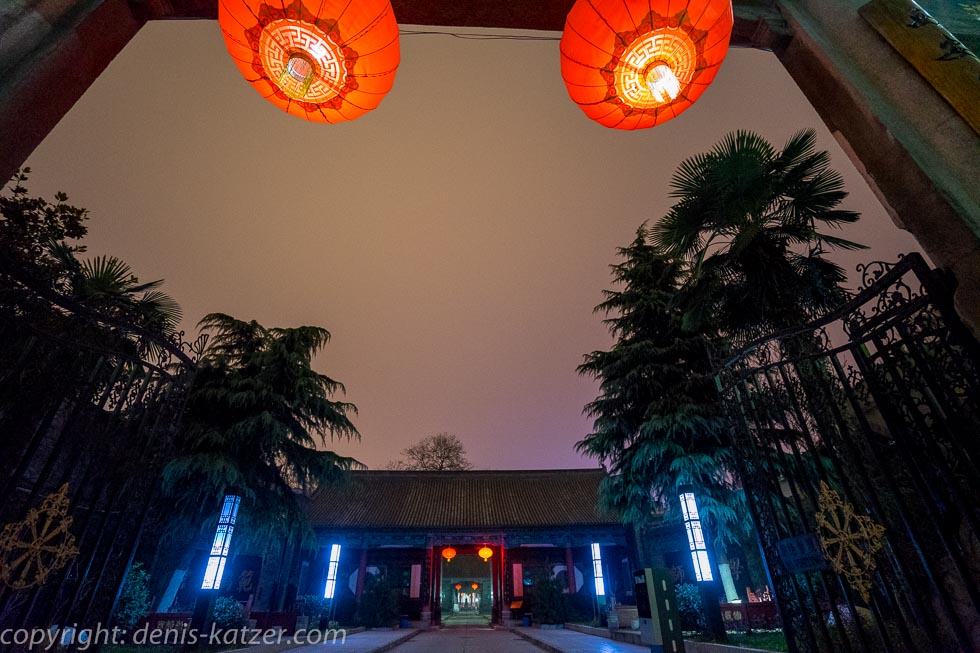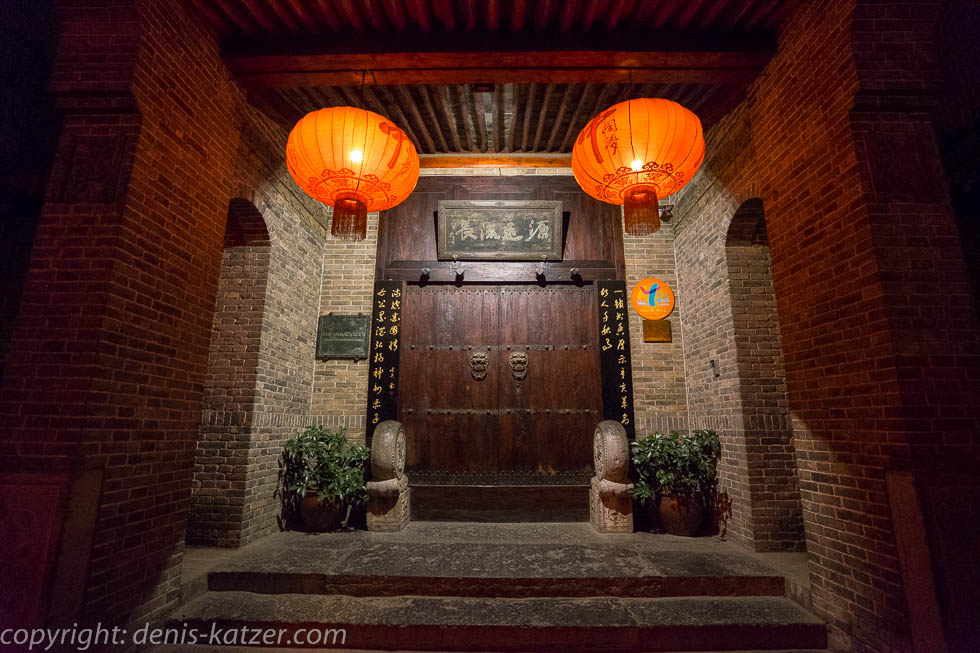
In the cauldron of the imperial city of Xi’an
N 34°15'16.4'' E 108°56'44.1''
Date:
06.12.2015
Day: 161
Country:
China
Province:
Shaanxi
Location:
Xi’an
Latitude N:
34°15’16.4”
Longitude E:
108°56’44.1”
Daily kilometers:
130 km
Total kilometers:
11,431 km
As the crow flies:
73.98 km
Average speed:
21.4 km
Maximum speed:
45.6 km
Travel time:
8 hrs.
Soil condition:
Asphalt
Maximum height:
600 m
Total altitude meters:
13.679 m
Altitude meters for the day:
381 m
Sunrise:
07:34 am
Sunset:
5:34 pm
Temperature day max:
5°C
Temperature day min:
0 °C
Departure:
10:00 a.m.
Arrival time:
7:00 p.m.
(Photos of the diary entry can be found at the end of the text).
After a week in bed, we finally move on. I’m not one hundred percent fit yet, but I feel strong enough for the 80 km to the city of Xi’an. Again I navigate with the map program via my cell phone and our GPS. I place navigation points at critical points. This should save us unnecessary detours. After about 50 km, I have the choice of following the S208 to the left or taking the longer G210 highway, which leads directly to Xi’an. Not knowing that I would have to accept such a huge detour, I decide to take the shorter S208. Since this decision, we zigzag along for two hours without really getting any closer to Xi’an. Then finally the kilometers towards the city shrink, but we land at the international airport. Trapped on a busy eight-lane road that leads in the completely wrong direction, I ask some men from a special unit posted at the side of the road for directions. At first, the heavily armed men look at us with wide eyes. “What kind of strange birds are these?” they seem to ask themselves. But then they laugh in a friendly way and try to explain to us how we can escape from the maze of ring roads and bypasses. One of the men even pulls out his smartphone, on which he has had the directions translated into English. Xiexie (thank you) we say thank you and cycle around a few departure halls in the mass traffic of a huge airport until we involuntarily end up on a highway. “Can we drive here?” asks Tanja. “Surely not, but according to the GPS, this route leads in the right direction. Apart from that, we had no choice but to take this highway,” I reply, hoping not to be stopped and punished by the police. After about eight kilometers we stand in front of a gigantic toll station. It is no longer possible to progress here. A uniformed woman jumps out of her house in horror at the sight of us. Waving excitedly, she makes us understand that we are not allowed to continue here. “But what should we do?” we ask. “You have to go back,” she orders. “Against the traffic?” She points in the other direction and shows us how we can cross over from here without causing any damage.
Ten minutes later, we are cycling back towards the airport on the highway. “Luckily they didn’t punish us,” I say, but I’m frustrated by the constant back and forth and the detour. I’m still not sure how we’re going to get to the city center in this maze of streets. The only connections to the center seem to be highways. We take the first exit to leave the highway and cycle back towards the toll station. But this time on a side road. No longer looking at the GPS or being distracted by MAPS.ME, which always misdirects us on highways, I follow my instincts. We cross large vegetable fields on small roads. Then we discover a bridge that crosses the highway. As we cross it, we see the toll station where we were sent back a good hour ago. We wind our way through narrow alleyways bordered by brick walls to the left and right. Suddenly we find ourselves in the center of a market. People look at us as if we were intruders. Then they start to laugh. I try to switch on the movie camera on my handlebars. Unfortunately, the batteries are dead. It is grilled, cooked, boiled and steamed. The narrow road is blocked. Nothing works anymore. Next to us, a corpulent Chinese woman rolls out dough, while another cuts it into strips, wraps them over her hands and elbows, cuts them again and throws them into a wok with boiling water. The flour strips are now cooked in it to make noodles. It smells of everything imaginable and unimaginable. Chickens are hung upside down, some of them already roasted. A man stirs vigorously in a large wok, another serves tea. There is shouting, screaming and haggling. Bundles of socks lie on the floor next to stovepipes, handsaws, ladles, rolls of cloth and wire and buckets, while toilet paper, lighters, hand soap, stuffed animals and other odds and ends are on sale at a stall right next door. The range is amazing and there is simply everything, even what is not available. Sudden change of scene. The swirling mass of electric rickshaws, scooters, mopeds, cars and pedestrians moves on, only to stop again. It smells different in this area. Sheep and goats bleat and bleat from the loading areas. Obviously, this is the end of the line for them. They are bought by chefs and restaurant owners to end up on a plate in the foreseeable future, carved in the Chinese style. Before we know it, the market spits us out again. Breathing a sigh of relief, we drive on through a strange, bizarre and highly interesting world. The on-board computer already shows 110 kilometers per day. As the crow flies, it is only 10 km to the coordinate point. If we make it to our accommodation in 20 km because of the twists and turns, the zigzags and back and forth, we’ll be lucky.
As we cross the largest tributary of the Yellow River, the Weihe He, the sun casts its last rays over a few high-rise buildings. The atmosphere is strange. The veil of smog has settled over the entire city. Construction cranes stretch their skeletal rear wheels into the hazy pink of the waning day. And suddenly the small alley pushes us into the evening traffic hell of a city with 4.5 million inhabitants. The jumble of pedestrians, bicycles, mopeds, electric scooters, cars and double-decker buses is indescribable. The honking, tooting, ringing is confusing. The blazing sea of lights cannot be described in words. It clicks in our heads, switches to the flow mode that is essential for survival and guides us through the human witch’s cauldron. We sense the thousands of road users around us, perceive them with every cell in our body and become one with the larger organism. We understand the law which basically gives right of way to the strongest. Whether he is right or not is irrelevant. Law is redefined here, subject to the code of a big city. There is tailgating, squeezing in at the last second, threats, blocking, sometimes braking and swerving. The aggression is remarkable, noticeable at every second. The stress level is at the limit. Chaos rules here and it’s amazing how it works. As if it has its own dynamic, its own indefinable rhythm. In the pulse of Xi’an’s heartbeat, it pushes and presses us further and further inside, into the center of an urban way of life. “It has to be here,” I say after 130 kilometers and ten hours beneath the historic city wall. “Here?” asks Tanja because we don’t recognize anything that looks like the Seetang Youth Hostel in the sea of lights, the countless cars whizzing by and the thousands of people. I push my bike on the sidewalk. Hundreds of Chinese tourists and residents of the city surround us, looking at us with disconcerting glances. Some of them skeptical, some curious, some interested. “Can we help you?” ask two young female students in good English. “Yes,” we answer. “We’re looking for the Seetang Youth Hostel.” Tanja gives them the coordinates, which they immediately enter into their smartphones. After a while, they get their bearings and ask us to follow them. We leave the main road and push our roadtrains into an alley that looks like it was built a thousand years ago. Within a few seconds, the past has caught up with us. Small cookshops, craft stores and red lanterns welcome us. Seetang Youth Hostel beams out at us from a sign. We thank the two young women and let the youth hostel know that we are there. Maggy and Sindy, two young women at reception, greet us cheerfully and help us carry everything we have inside. Because we have so much luggage and there is no special room for our bikes and trailers, we get one of the three family suites at a special price of 240 yuan per night. (33,83 €) A lot of money for us as long-term travelers, but the gallery room is awesome and promises us a pleasant stay in such a big city. We put our bikes under the stairs that lead up directly under the roof. There is a large double mattress covered with fresh bedding that almost fills the small room. The cozy bed is framed by a wooden railing with glass in between, allowing a view down into the room. “Wow, what a great place to stay. I can finally write down my notes here,” I say. To have more space in our room, we put our trailers on our own balcony. Then we wash the coal dust and smog from our faces and climb two floors up to the roof terrace of the hostel. Up there we are surprised by a cozy restaurant where you can also find real chips on the menu. An absolute rarity in China. We enjoy two plates of it and wash it down with German beer, which is also on offer here…
The live coverage is supported by the companies Gesat GmbH: www.gesat.com and roda computer GmbH www.roda-computer.com The satellite telephone Explorer 300 from Gesat and the rugged notebook Pegasus RP9 from Roda are the pillars of the transmission.
